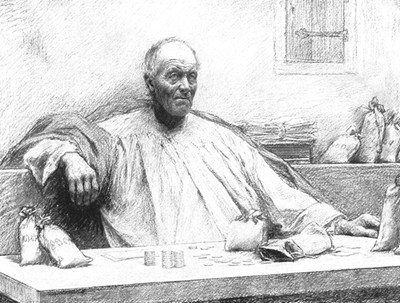If we're ever looking for some "words of wisdom" on life, the Book of Ecclesiastes is a very good place to start. Right off the bat, we are reminded that nothing can survive death - no success, reputation, gain or profit will last beyond a person's lifetime. To believe otherwise is "vanity of vanities." In case we've ever been intoxicated and distracted by a reliance on what we have achieved on our own, today's excerpt can quickly sober us up. Life is not fair. Far from it. It is imperfect, limited and sometimes oppressive. Ecclesiastes shakes the comfortable-ness out of our dreamy, rose-colored illusions and brings us back to reality.
 Jesus often uses this same kind of intrigue. He uses parables to help us understand that we will only find true and lasting happiness when we divest ourselves of earthly treasures and invest in the kingdom of God.
Jesus often uses this same kind of intrigue. He uses parables to help us understand that we will only find true and lasting happiness when we divest ourselves of earthly treasures and invest in the kingdom of God.
Investing on any level is always a risk. One has to give up something in the hope of obtaining something even more valuable. However, we need to look closely at the kind of investment Jesus asks of us. Even before that, we have to fully understand what "the treasure" really is. We need to recognize the enduring value of the love of God and neighbor. If we can come to understand this, then - and only then - will we be willing to put aside the vanity of treasures that keeps us from becoming "rich in what matters to God."
Jesus lived his life always as one of service to others. He always put the welfare of the people around him above all else. He cured the sick, gave sight to the blind, hope to the hopeless. And he ministered to all people, saints and sinners alike. He felt comfortable with everyone he met and even forgave his enemies. He never turned his back on anyone.
Every invitation of Jesus "to follow" always contains a built in "challenge to action." Being a disciple means more than just being comfortable within the group. It means more than just praying for the good of one another. It requires actually working for the good of one another.
The man in the parable is called a fool not because he is stupid, but because he does not appreciate the true purpose of his wealth. There is nothing wrong with wealth. There is nothing wrong with eating and drinking and being merry. This is why we were created - to live a full and joyful life. But in God’s perspective, if you have more than you need, the challenge is not how to store it, but how to share it. In a world where so many struggle to survive, we must be willing to share from our abundance. In the mind of Jesus, that is what matters most.
Where have we stored our treasure? Where have we committed our hearts during our journey through life? Have we sought riches and power and prestige among the very elite of our community? Or have we cast our lot with the poor, the homeless, the downtrodden and forgotten? What exactly do we do with our treasure?
* The Rich Fool - by Eugene Burnand





